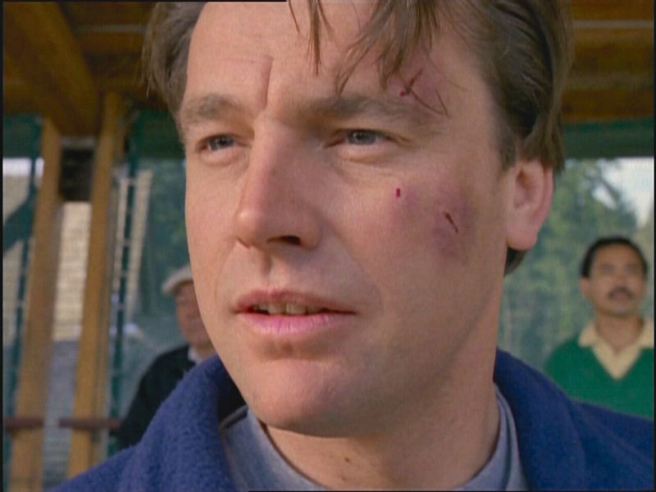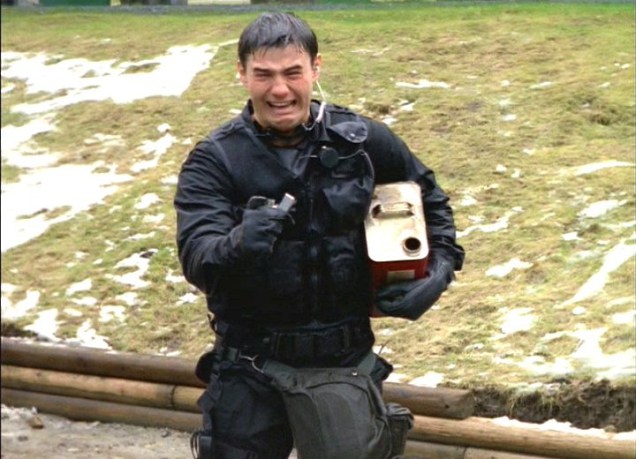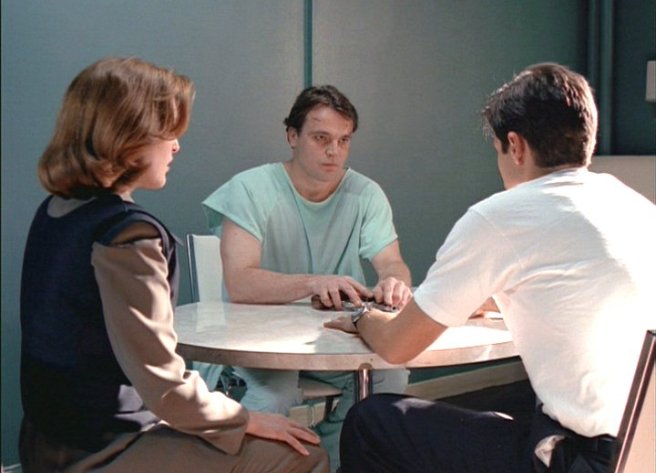In a new series of features regarding the favourite episodes of our blog writers, Tony Black discusses his one true X-File love, 'Pusher'...
--
“You mean you killed this man for nothing, you sick bastard?”
“Oh haven’t you figured it out yet, Mulder? They all kill themselves.”

One of the chief inspirations for FBI Special Agent Fox Mulder, erstwhile and dogged investigator of The X-Files, was the master of detection, Sherlock Holmes. Chris Carter himself has cited Arthur Conan Doyle’s legendary literary figure as a touchstone for Mulder, with his remarkable leaps of logic to explain the unexplained, not to mention his eccentricities and detachment from traditional life & relationships – plus he has a ready made Dr. Watson in fellow Special Agent Dana Scully, yanked out of her normal existence, swiftly enraptured by Mulder’s world. Up until ‘Pusher’, the seventeenth episode of The X-Files‘ third season–as the show was really hitting the mid-90’s zeitgeist–Mulder had never found his Professor Moriarty, his nemesis. He arrived ready-made in Robert Patrick Modell, the eponymous ‘pusher’, and the result saw Vince Gilligan deliver the finest X-File in the show’s (to-date) ten season run.
The genius of ‘Pusher’ is that it’s one of those concepts, even for an X-File, that is breathtakingly simple yet beautiful in construction; a man capable of talking another human being into doing whatever he desires, a form of mind control inducement thanks to the cadence of the person’s voice. Giving that power to a twisted, bitter sociopath who wants nothing more than a worthy adversary is a stroke of brilliance, and that’s the central key to ‘Pusher’ being such a perfectly constructed hour of television.
The X-Files by its very nature, much like Doctor Who, has the freedom to go almost anywhere and tell a myriad of stories, such is the vast canvas of the paranormal & unknown in our world; when it isn't about global alien conspiracies, man-eating monsters or natural pathogens or predators, often the more intriguing character-based concepts come into play – the reality bending seduction of ‘Milagro’, the unnerving fetishism of ‘Irresistable’ or cold hearted pain of ‘Paper Hearts’. With ‘Pusher’ it was a battle of wills, a chess match between two adversaries, as Mulder desperately begins to realise that Modell simply wants to watch the world around him burn, look into the face of the man good enough to beat him, and smile. Though he wants to be Moriarty, in truth he’s more like the Joker. Scully describes him at one point as “a little man who wants everyone to believe he’s big” and that’s the tragic, sometimes jet black comic ideal driving ‘Pusher’ as an episode.
“Modell psyched the guy out, he put the whammy on him!”
“Please explain to me the scientific nature of ‘the whammy’.”

Enormous credit must go to guest star Robert Wisden as Modell, because it’s his performance that truly sells Gilligan’s marvelous writing; he’s sly, calculating, quippy and strangely charming, a hugely tricky balance to pull off, but Wisden is able to flip between these styles at will. At one moment Modell may be calmly talking a court judge out of sentencing him, almost the friendly neighbour next door, then the next he’s inducing a cop to immolate himself, taunting Mulder jokily over the phone or, in arguably the second most memorable scene of the episode, talking bullish local detective Frank Burst into having a heart attack over the phone. It’s truly chilling and the moment of complete shock and horror on the faces of Mulder, Scully and the team of detectives around Frank at that point still sends a chill down the spine – topped off when Modell then calmly gives them the pay phone number Frank was keeping him on the line to trace.
Wisden manages to craft the finest ‘human’ monster the show ever created – especially given that tinge of tragedy to the man; he’d spent his life being average, amounting to little, and only upon discovering his ‘power’ was he able to make any kind of mark, styling himself after the Japanese Ronin, a ‘warrior without a master’. Gilligan manages to tap into this psychology while always keeping Modell alien enough to be frequently terrifying.
In many of the stand alone episodes of The X-Files, you got the feeling it was just another case for either Mulder & Scully, sometimes having a deeper impact on the guest stars than they themselves. For Mulder in particular, ‘Pusher’ you know stays with him. That’s borne out indeed two seasons later in sequel episode ‘Kitsunegari’ which while vastly inferior, actually serving to hugely neuter Modell’s power, does show how much Mulder felt strongly Modell should die for his crimes in ‘Pusher’. Often he can saunter through a case facing a few scrapes but coming out the other end proven right and unscathed bar some cuts & bruises, but both times he encounters Modell he’s marked; you can feel the moments in ‘Pusher’ where Mulder is being pushed, being drained, such as his vociferous prosecution and frustration at the judge after he catches Modell, and later his aforementioned fury at Frank Burst’s chilling murder (and his desperate attempts to save him when he realises what Modell is doing).
It all culminates in, appropriately, the show’s final act, an absolute master stroke in narrative tension from Gilligan and particularly director Rob Bowman, which sees a ‘pushed’ Mulder led by the dying Modell into a final battle of ‘Russian roulette’ in an evacuated hospital, with an emotional & shaken Scully acting as arbiter at the table. David Duchovny & Gillian Anderson give it their all, you can feel the power, tension and emotion at that table as Modell strives to win his final victory.
“It was like you said. He was always such a little man. This was finally something that made him feel big.”
“I say we don’t let him take up another minute of our time.”

The reason that ‘Pusher’ might be the greatest X-File ever made isn’t just because of Vince Gilligan’s supreme script, or Rob Bowman’s expert direction, or indeed the magnificent guest performance of Robert Wisden, but rather because for a show built around the unknown, about the monsters within and without, Robert Patrick Modell was never truly a monster at all. He committed horrific crimes. He was deeply twisted and hateful. But he was also a sad, lonely, desperate figure whose only way of making a stamp on the world was by controlling the whims of others and, perversely, trying to grab the attention of the man he no doubt wished he could have been. That wonderful sense of twisted humanity is what drama, what great storytelling, is all about.
As for this reviewer, as Modell’s victims might say, he had to go.
--
This article first appeared on Failed Critics in July 2015. You can follow Tony on Twitter @Mr_AJ_Black.

No comments:
Post a Comment